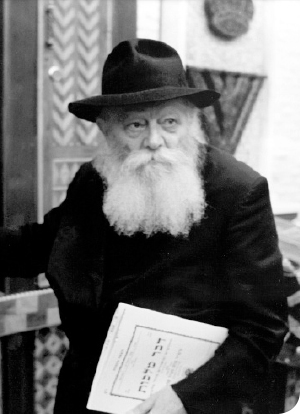Part Two * Since Rav Yochanan had no special connection to Elisha ben Avuya, why did specifically Rav Yochanan seek to save him and indeed succeed in doing so?
Translated by Boruch Merkur
 1. First off, to clarify the position that appears in Shas and Poskim that it is possible that even utterly and grievously wicked people (see Yevamos 32b, Sanhedrin 47a) will ultimately come to merit T’chiyas HaMeisim (but not Gan Eden, as above):
1. First off, to clarify the position that appears in Shas and Poskim that it is possible that even utterly and grievously wicked people (see Yevamos 32b, Sanhedrin 47a) will ultimately come to merit T’chiyas HaMeisim (but not Gan Eden, as above):
a) REPENTING, EVEN IF ONLY IN ONE’S HEART: The Mishna teaches that “All Jews have a portion in Olam HaBa … And those who do not have a portion … Yeravam, Achav, and Menasheh, etc.” (Mishna Sanhedrin 90a). Rambam rules in Laws of Repentance (Ch. 3:5 ff.) that “All Jews have a portion in Olam HaBa even if they had sinned … And those who do not have a portion … These exceptions, those who do not have a portion in Olam HaBa, refer to those who die without repenting. However, should one return from his wickedness … even had he denied the central principle [of belief in G-d] his entire life but at the end of his life he repents (see Yerushalmi Peia 1:1), he has a portion in Olam HaBa, etc.”
And Rambam continues (3:14): “All wicked people and all mumrim [i.e., either those who sin to anger G-d or apostates – see Ibid 3:9] and the like who repent … even if in secret … even if the person is still struggling [to maintain his newfound commitment] – which is apparent in the fact that he repents in secret [in his heart] not outwardly [by correcting his behavior] – his repentance is accepted.”
b) ONE WHO DIES WITHOUT REPENTING: A worse scenario is the case where one does not repent before his demise, not even in secret.
Our Sages said (Sanhedrin 104a), “A son brings merit to his father.” This means that if the son is righteous, he brings the life of Olam HaBa to his deceased father, one who is among those who have no portion in Olam HaBa. That is, the father merits Olam HaBa even without any prayer for this result on the part of the son. For with regard to prayer, even a father can bring merit to his son, as explained in the second answer in the Tosafos entry beginning with the words “D’isei” (Sota 10b).
In fact, there is benefit from the effort and prayer of those who are not relatives, as stated in Chagiga (15b): Rav Yochanan helped [the soul of the Talmudic Sage] Elisha, Acher (even gaining entry for him to Gan Eden), even though Rav Yochanan was not his relative nor his student.*
It is just that the prayer of others is not as effective as the prayer of a son or a father. Indeed, there are varying degrees of the effect of prayer with respect to the person who prays [and their relationship to the one for whom they pray], as well as the place where he prays, and other factors. But this is not the place to elaborate on the matter.
NOTES:
*Footnote 4: At first glance this requires further inquiry. Since Rav Yochanan had no special connection to Elisha ben Avuya, why did specifically Rav Yochanan seek to save him and indeed succeed in doing so?
To answer: What caused Acher to stray from the path of Torah? Our Sages provide several reasons, events that had a negative impact on him that occurred in different instances. It is logical to presume that these opinions are not in conflict about the facts. Rather, one Sage provides one reason and another Sage provides another, but they are not mutually exclusive. Or they are arguing about which cause overshadows the others, yet all of the events indeed took place and each contributed to his downfall. The cause that predates all the others is that his mother, when she was pregnant with him, “passed before a place of idol worship and smelled the aroma of the forbidden offerings. She then ate of that food and it seeped into her like snake’s venom.” (This version is consistent with the citation of Tosafos from the Yerushalmi (Babylonian Talmud Tractate Chagiga 15a, entry beginning with the words “Shuvu”). Likewise in Midrash Rabba Rus 3:13 and Koheles Rabba 7:8, as well as Yalkut Shimoni there. See below pg. 138 for more on the matter.)
Now, this episode can serve in defense of Elisha ben Avuya to minimize his guilt [as it was not his fault], but in accordance with what our Sages say in Yoma (35b), there is another factor that has the opposite effect: “Hillel brought guilt upon the poor … since notwithstanding his own poverty, etc.” [he devoted himself thoroughly to Torah study]. So too in the case of Elisha ben Avuya, Rav Yochanan brought guilt upon him since he too suffered the same fate as Acher prior to birth [yet his righteousness remained intact]. That is, when his mother was pregnant with him, etc., and still, etc. (Yoma 82b, see there as well as Yalkut Shimoni Koheles regarding Elisha’s mother: She was not able to hold off until, etc.)
On this basis, the prayer of someone else other than Rav Yochanan on the behalf of Acher would not have had as much benefit to erase the damage inflicted on him by his mother eating from the forbidden food. It was specifically the prayers of Rav Yochanan that brought salvation to Elisha ben Avuya, because he who would otherwise have been a source for accusation served instead in his defense, v’kal l’havin.
(To be continued be”H)
(From a letter dated Monday, the 16th of Tammuz 5703; Igros Kodesh Vol. 1, pg. 141 ff.)